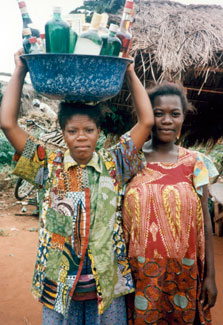Studying alcohol and HIV: a dangerous combination
May / June 2016 | Volume 15, Issue 3
There is no safe level of alcohol consumption for people being treated for HIV, scientists say, yet it commonly occurs among those living in low-income settings, compromising drug therapy and encouraging the spread of disease through risky behavior. More than two-thirds of the global population living with HIV is located in sub-Saharan African. More than half are women and 1.4 million new cases are diagnosed annually, according to UNAIDS. One strategy to combat the epidemic is to address the alcohol use and abuse that help fuel it.

© 1996 Sara A. Holtz, Courtesy of Photoshare
Women sell alcohol at a market in Aného,
a town in southern Togo.
"Alcohol is a driver of the epidemic both from a prevention and treatment point of view," says Dr. Kendall J. Bryant, director of HIV/AIDS research at NIH's National Institute on Alcohol Abuse and Alcoholism (NIAAA). Drinking impairs judgment and cognition, which can lead to unprotected sex, multiple partners, and failure to follow the antiretroviral therapy (ART) regimen that keeps the virus in check. Alcohol causes biological problems, too. By damaging the liver, alcohol can interfere with the body's ability to process antiretroviral medications, for example.
NIAAA grantees are working with collaborators in sub-Saharan Africa to better understand alcohol's role in HIV, and identify interventions that decrease consumption, reduce the spread of disease and improve adherence to ART. Researchers look at what people drink and where they gather to do it. Traditional homemade brew is believed to make up the highest proportion of alcohol use in the region. It's unregulated, untaxed so cheaper, and often stronger and more toxic than commercially produced beverages. The Kenyan brew chang'aa, for example, is the equivalent of two standard U.S. drinks, according to an NIAAA study.
"Another issue in low- and middle-income countries is that there are a lot of migrant worker populations - primarily men who will be drinking heavily and often engaging in higher risk sexual behavior that forms kind of a framework for transmission," Bryant observed.
NIAAA grantees are conducting a number of studies to identify interventions aimed at patrons of drinking venues, where people often meet new sex partners. One study in Cape Town, South Africa found that alcohol was commonly used as a currency for sex and contributed to the risk of HIV because it often led to unprotected intercourse with multiple partners. Through observations of heavy drinking in the bars and in-depth interviews with regular patrons, field workers noted it was accepted practice for men to buy alcohol for women, in exchange for sex, with women having little ability to negotiate for safe terms. Women reported going to the venues and drinking out of boredom and to escape poverty, unemployment and other pressures at home. The findings, researchers note, suggest the need for interventions that address alcohol abuse and dependence, as well as ways to help women find jobs and healthier entertainment options.
Cognitive behavioral therapy (CBT), which teaches people coping skills, is being investigated as a way to reduce alcohol use. A pilot study in Kenya found that 69 percent of people who received CBT abstained from drinking for 90 days, compared to 38 percent who got the usual care. A larger trial is now underway.
Researchers in Uganda are investigating how heavy alcohol use affects the progression of HIV. One study of patients in an HIV clinic found that people reduced their drinking when starting HIV care, but couldn't sustain it while on ART. Scientists say they believe this was the first study to use a blood test that looks for biomarkers of alcohol in addition to the patient's self-reporting of alcohol use. Investigators say augmentation increases the accuracy.
"When I first came to NIH, alcohol was not an issue in HIV, no one paid any attention to it," Bryant says of the evolution that's taken place over the past 20 years. Now there's so much interest, a conference to explore new tools for addressing alcohol and HIV in LMICs is being planned to coincide with this summer's International AIDS Conference in Durban, South Africa.
More Information
To view Adobe PDF files,
download current, free accessible plug-ins from Adobe's website.